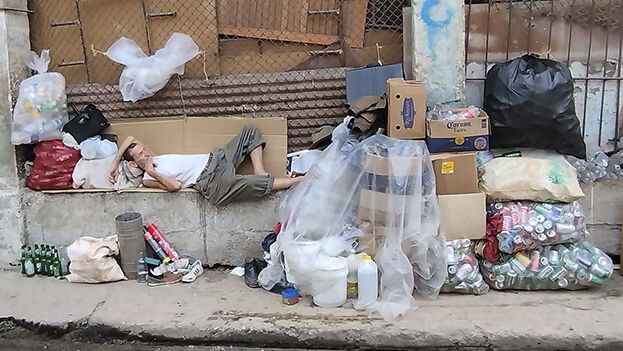
![]() 14ymedio, Havana, 20 October 2022 — Cubans’ concerns over the island’s food shortage have grown over the last year according to a recent report from the Madrid-based Cuban Human Rights Observatory (OCDH). The organization’s 2021 report found 60% of Cuban citizens believed food insecurity was a major problem. That figure has grown to 64% this year.
14ymedio, Havana, 20 October 2022 — Cubans’ concerns over the island’s food shortage have grown over the last year according to a recent report from the Madrid-based Cuban Human Rights Observatory (OCDH). The organization’s 2021 report found 60% of Cuban citizens believed food insecurity was a major problem. That figure has grown to 64% this year.
The OCDH began polling 1,227 people from 59 municipalities in 14 provinces in July. Its most troubling finding was that 72% of Cubans are living below the poverty line, which the World Bank defines as a daily income of less than $1.90. This is striking for a country that fought a revolution to abolish class distinctions but which has an enormous disparity between those who receive remittances from abroad and those who do not. Of those who said they do not have enough money to buy things essential for survival, 27% receive remittances and 65% do not.
After the food crisis, currency unification was cited as the second most pressing problem (36% in 2022 versus 29% last year), followed by inflation (with concern among Cubans almost doubling from 17% to 31%). The political situation remained in a fairly stable third place, though the number of those who considered it a serious problem rose six points. As a major issue, the government came in fourth, rising eight points, while concern over civil unrest went from 12% to 17%. In contrast, emigration, which was a major concern for only 7% of the public in 2021, rose to 18% this year.
Of those polled, 74% view the government’s economic management negatively while 51% view it “very negatively.” The study also found just how disaffected the nation’s youth are with the current political system. For 42% of those who are 18 to 30-years old, it is the country’s biggest problem. This age group also expressed a high degree of concern for those in prison, with 25% of them citing it as a major problem. This is understandable given the high number of young people incarcerated for participating in protests. The generational divide is also evident when in comes to the embargo. It is a major concern for 14% of seniors aged 61 to 70-years-old.
The study also indicates that the health care system suffers from systemic corruption, with 56% of those polled saying they have provide a gift or pay a bribe to receive medical treatment. Eight out of every ten people cannot get the medications they need and must turn to the black market, family members overseas or, in most cases, church-based charities (57%).
The numbers are also devastating when it comes to basic services. Some 44% of respondents said their homes needed serious repair while 23% said they are in danger of imminent collapse. Only 23% said their homes are in good shape. Meanwhile, 15% said they lack drinking water and 72% said they have experienced power outages. In July and August 62% of those polled said they were experiencing power outages lasting more than six hours.
On the labor front, 30% said they have full-time work, 14% said they work part-time, 15% are retired and 10% do not work. If we take into account those who work in the home (15%), those who are sick or disabled (5%) and those who are students (6%), it becomes clear that the state is relying on only a small segment of the population for financial support.
It is significant that the majority of those polled, a full 82%, believe there is discrimination in hiring, mainly on ideological grounds. Additionally, 70% believe the labor unions are not democratic and, as a result, 72% said they do not belong to any labor relations organization. Also, 64% believe workers’ rights are not respected in Cuba.
Lastly, some sad statistics: A majority of Cubans say they are unhappy, with 55% expressing this sentiment; 13% say they are “totally unhappy” and only 14% say they think things could get better in the coming years.
“It has been more than six decades with a political, economic and social model that does not work. The lives of a majority of the population are overwhelmed by a shortage of food and medicine, and the deterioration of all public services. The protests that have occurred in recent weeks in various locations on the island, protests in which people are demanding freedom, are the result of this disaster. Awareness is growing that the cause of Cuba’s socioeconomic problems is political,” says the OCDH, which released its study on Thursday.
“The state of civil rights in Cuba should serve as a strong warning to those overseas who still believe that the Cuban model can be applied in their countries,” the report concluded.
____________
COLLABORATE WITH OUR WORK: The 14ymedio team is committed to practicing serious journalism that reflects Cuba’s reality in all its depth. Thank you for joining us on this long journey. We invite you to continue supporting us by becoming a member of 14ymedio now. Together we can continue transforming journalism in Cuba.
